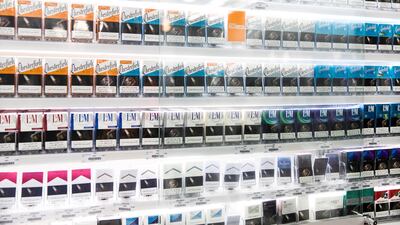In August, the President, Sheikh Khalifa, signed into law proposals to introduce excise taxes for tobacco and fizzy beverages. This week, the law comes into effect. From October 1, smokers will have to be pay twice the amount for a packet of cigarettes, and consumers of sugary drinks will have to shell out 50 per cent more. The law's purpose is deterrence. According to the World Health Organisation, some 8 per cent of the UAE's population suffers from diabetes, while more than 70 per cent of its people are overweight and 34.5 per cent are obese. According to statistics published by the Tobacco Atlas, more than 18 per cent of male adults and 2.5 per cent of female adults in the UAE are smokers. Among the youth, the rates are shocking: more than 15 per cent of boys and nearly 6 per cent girls consume tobacco.
The consequences of these twin addictions are grim. By some estimates, tobacco addiction on average claims 26 male lives and one female life every week in the UAE. Unhealthy dietary habits are causing obesity to spiral out of control. By 2047, the UAE is estimated to spend $47.5 billion on healthcare to tackle obesity. What people think of as private addictions end up creating enormous burdens on public health services. This newspaper has a long record of calling for a tax on sugary drinks and tobacco, and it is hardly surprising that doctors have welcomed the new taxes. Studies elsewhere have shown that higher prices can moderate consumer behaviour, especially of young consumers.
_____________
Read more
UAE excise tax on sugary drinks and cigarettes to start on Sunday
'Obesity will see UAE healthcare spending double by 2040'
_____________
Our expectations of the new law, however, must be tempered with realism: the pinch of higher prices will probably yield to the power of addiction. Smokers will not give up cigarettes altogether, nor will children stop consuming sugar-laden drinks, because prices have gone up. Nonetheless, the new tax is an important step in the UAE Government’s push to improve public health. It should be augmented with educational campaigns that spread awareness among people of the effects of smoking. Parents should be dissuaded from buying sugary drinks for children.
Eventually, deterrence must be accompanied by incentives. This can take the form of cheaper health insurance premiums for non-smokers and people who maintain a healthy and balanced lifestyle. A more radical approach would be monetary incentives. An experiment in the United States invited smokers to deposit $150 with their employers; those who subsequently quit smoking received $650 in addition to their original deposit. The results, published in 2015 in the New England Journal of Medicine, showed that the creation of financial incentives was the most effective way to stop smoking. Such an approach, of course, will require employers to play an active role. But the eventual returns, in terms of reduced insurance costs and improved employee performance, make the initial investment worth it. The fight against addictions is a long and arduous one, but a conscious movement in the right direction has begun.
Follow The National's Opinion section on Twitter

